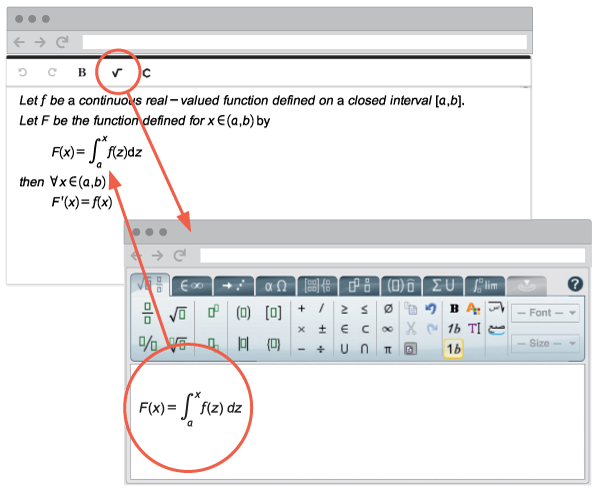Mono-repository for the MathType Web plugins and their dependencies.
This project requires basic knowledge of the git and npm commands.
It also uses the npx tool which comes bundled with npm.
To install node and npm follow this guide-npm, and use this other one guide-git to install git.
Lerna is used as a cornerstone of the project structure. Its main features are explained in this guide.
In this section we give a small description of the files that we consider the most important of the project, also we will talk about the content of the subfolders of the project and its usefulness.
lerna.json,package.json,package-lock.json. Configuration files for the root npm package and the Lerna mono-repository.packages/. Each folder contains one npm package. All the usual npm commands work inside.demos/. A growing set of technical demos to help developers integrate these plugins on different scenarios.scripts/. Folder containing different scripts used at compile time, etc.resources. Folder containing different resources files that are needed in the demos folder.
In the next list, you will see the editors that have a specialized WIRIS plugin of the mathtype formula editor.
CKeditor 4CKeditor 5Froala 2Froala 3TinyMCE 4TinyMCE 5genericis a global integration made so that, from there, the WIRIS plugin can be integrated into any editor by following its steps.
Follow these instructions to use the libraries.
First, clone the repository
$ git clone https://github.com/wiris/html-integrations
$ cd html-integrations
html-integrations$You will need to have administrator privileges or activate
developer mode
in your account, and then use the core.symlinks when cloning the repository:
projects$ git clone --config core.symlinks=true https://github.com/wiris/html-integrationsAfter cloning this repo, open a Terminal window to run these next commands:
$ npm install
$ npm startIn case you want to try out the Technical Demos you can go to the demos folder and follow the instructions you can find in the folder README file.
The mono-repository is managed through Lerna, a tool designed for maintaining multiple npm packages in a single git repository.
Before using Lerna, it is recommended to install the development dependencies
stated in the root package.json file as they are used in the scripts of all
packages:
html-integrations$ npm installIt is possible to compile manually all the packages. What this does is try to find which dependencies of the mono-repo packages are present inside the mono-repo itself, and link to them instead of downloading them from the npm repository.
html-integrations$ npm startIf this fails, try using npx:
html-integrations$ ./packages/mathtype-ckeditor5/npm pack
html-integrations$ npx lerna bootstrapTo try out a single package, it can be compiled individually as such:
html-integrations/packages/mathtype-[editor]$ npm run compile -- [tech] [--dev]Where [editor] can be any of:
ckeditor4,ckeditor5,froala,froala3,generic,tinymce4,tinymce5;
and [tech] can be any of:
aspx,java,npm,php,ruby.
The --dev optional flag calls the build-dev script defined in the plugin's package.json
instead of the build script.
This replaces the service provider URI and server with the appropriate values,
builds the sources with Webpack, and places the result in
html-integrations/output/[tech]-[editor].
Lerna allows to run a single command on all or any packages in the mono-repository. For example, you can build all editors for a all technologies like this:
html-integrations$ npx lerna run compile -- npmClean the output in the root folder and in the packages:
html-integrations$ npm run cleanClean the outputs and also all of the node_modules:
html-integrations$ npm run clean-allThis will require you to npm i and npm start in the root again.
There are configuration files at the root of the project to help. They statically analyze and fix code errors in files with extensions .js, .css and .html. The analysis shows the error and where it is, then it can be fixed. The commands are:
- To make a check of the .js files
$ npx eslint --quiet [options] <dir|file|glob>* - To make a check of the .css files
$ npx stylelint [options] <dir|file|glob>* - To make a check of the .html files
$ html-validate [options] <dir|file|glob>*
It is possible to automatically fix some of the errors, just add the --fix option in the desired command and run it.
In this project semantic, independent versioning is used.
The semantic version convention is applied:
Given a version number MAJOR.MINOR.PATCH, increment the:
- MAJOR version when you make incompatible API changes,
- MINOR version when you add functionality in a backwards compatible manner, and
- PATCH version when you make backwards compatible bug fixes.
Lerna introduces a tool lerna version useful for updating the appropriate
number for each package that has changes, making a commit, and tagging it.
In general, when publishing changes, just run:
lerna version --exactThis will prompt you with each package with changes since the last version and ask you whether to increase the patch, minor, or major number.
It is responsibility of the developer to keep track of which kind of changes have been introduced in each package.
The --exact option forces Lerna to modify packages that depend on others that
have been modified. For example, if @wiris/mathtype-html-integration-devkit is
modified, all the editor plugins that depend on it will also require to have
their version increased.
Each editor plugin that is distributed built (e.g. those that include a
webpack.config.js file) must have a prepack
npm lifecycle script, which is run
BEFORE a tarball is packed (on npm pack, npm publish, and when installing
git dependencies).
This script should build the package (generally by calling npm run build).
As a special case, the TinyMCE plugins call the services/compile.js script
because they need to have the source replaced before building.
In order to manually test each plugin, there's a set of technical demos on the 'demos/' folder.
Refer to the README file for more information.
Copyright © 2010-2020 WIRIS. Released under the MIT License.



